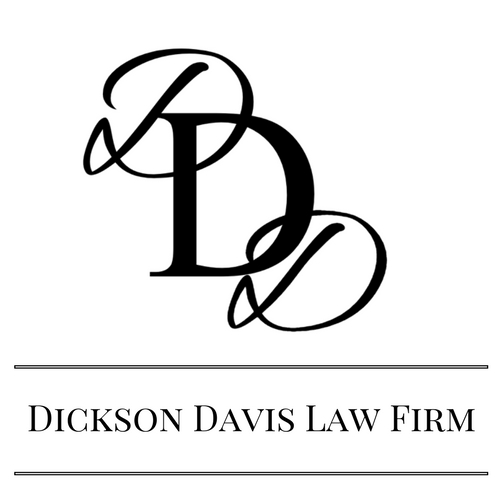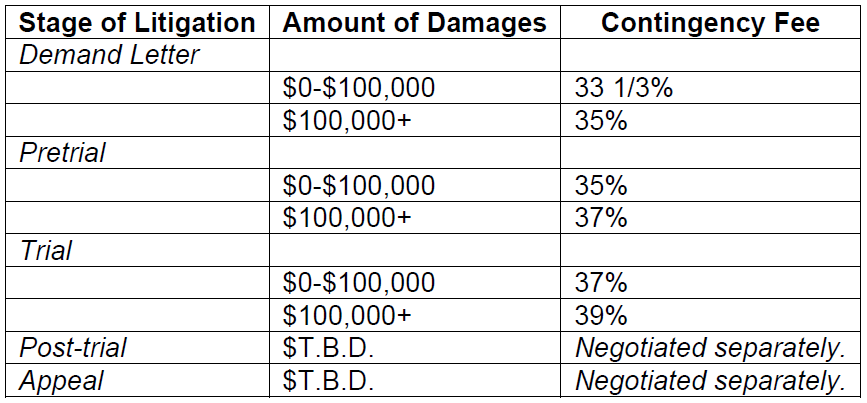Explaining Contingency Fee Billing Practices
Outside of personal injury cases, the Dickson Davis Law Firm does not offer contingency fee billing as an option.
A contingency fee contract is very common in personal injury for clients who typically cannot afford the costs of representation in civil litigation for personal injury matters. The Supreme Court of South Carolina promulgates the South Carolina Rules of Professional Conduct, which governs attorneys and requires a contingency fee contract to be reasonable. Contingency fees are subject to Rule 1.5:
A contingent fee agreement shall be in a writing signed by the client and shall state the method by which the fee is to be determined, including the percentage or percentages that shall accrue to the lawyer in the event of settlement, trial or appeal; litigation and other expenses to be deducted from the recovery; and whether such expenses are to be deducted before or after the contingent fee is calculated. The agreement must clearly notify the client of any expenses the client will be expected to pay. Upon conclusion of a contingent fee matter, the lawyer shall provide the client with a written statement stating the outcome of the matter and, if there is a recovery, showing the remittance to the client and the method of its determination.
For personal injury cases, the Dickson Davis Law Firm follows a sliding scale contingency fee based on the amount of damages involved and the stage of litigation for the client's case:
To be clear, a contingency fee contract does not mean that the client is not responsible for attorney fees or expenses at all. A contingency fee agreement simply defers paying the law firm should you prevail, not that the costs of litigation are cheaper because you are not paying anything up front.
With a contingency fee contract, and if you prevail in your case, the attorney still gets paid for services rendered, which is often in the manner of hourly billing plus the costs of litigation, in addition to out-of-pocket expenses related to the costs of litigation such as court filing fees, depositions (such as the court reporter, venue cost, or transcript fees), expert witnesses, travel expenses, venue fees for mediation (or arbitration), and so forth.
A law firm may operate very unprofitably (or unethically), and at the client's ultimate expense, that directly correlates with the amount the client actually recovers, if at all. The issue of abusing hourly billing practices may simply remain hidden within the contingency fee format of attorney billing for the line item of attorney fees for legal services rendered.
For legal services, the Dickson Davis Law Firm does a flat fee billing for certain items, and hourly billing on certain items. For costs of litigation unrelated to the legal services provided by the Dickson Davis Law Firm, the client is responsible for those costs directly of certain expenses.
For personal injury cases, the Dickson Davis Law Firm is only interested in taking on clients who are invested in their own case whether in the form of time, availability, and sharing the costs of litigation.
The Dickson Davis Law Firm’s contingency fee contract is a shared expenses type of contract where the client is still responsible for out-of-pocket expenses such as court filing fees, court reporters fees, costs of transcripts, mediator fees, mailing expenses, background check expenses, record request fees, service of process fees, travel time (if more than thirty miles away) and travel expenses, guardian ad litem fees, and so forth.
As a general firm policy, the Dickson Davis Law Firm is not a financier of your case. Only under certain circumstances, and on a case-by-case basis, the Dickson Davis Law Firm may entertain fully financing the total costs of litigation for certain clients that is solely at the Managing Attorney's discretion.
If the client shows a reliable, payment track record to litigation vendors, then the Dickson Davis Law Firm will be amenable to submitting reimbursement requests at the time of incurring those litigation expenses (unrelated to providing legal services) along with the copies of invoices from those vendors for the client to reimburse the Dickson Davis Law Firm accordingly.
The issue is whether the value of your case warrants the cost of litigation. You may still very well proceed with your case, but, if the likelihood of the recovery will more than likely only cover the cost of litigation leaving you with very little meaningful recovery, then the discussion between the attorney and the client is whether to pursue your case at all.
The Dickson Davis Law Firm does not cover all costs related to your case, of which common exclusions apply to the cost of depositions, the cost of expert witnesses, and so forth. The Dickson Davis Law Firm believes that clients who are more fully invested in their case from time, providing documentation, witnesses, and sharing the costs of litigation shows a stronger commitment to your case. The Dickson Davis Law Firm prefers to work with clients who are invested in their case both in the sense of time and sharing the burden of litigation costs. Only in special circumstances, and if the case facts warrant a strong case, will the Dickson Davis Law Firm arrange special arrangements to finance the litigation on a case-by-case basis with the Managing Attorney's approval.
No law firm or attorney may guarantee the outcome of any case nor promise you a certain dollar figure amount as your reward under the South Carolina Rules of Professional Conduct. The decision to proceed with a law suit, unfortunately, is a financial decision based on the client weighing the risks of litigation.
Talk with the Dickson Davis Law Firm to explore your options after a thorough consultation. We are here to help you make a meaningful decision regarding your situation.


